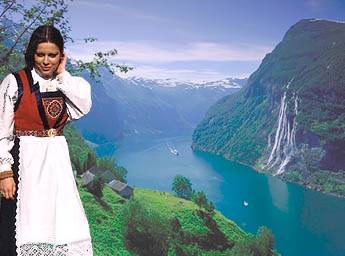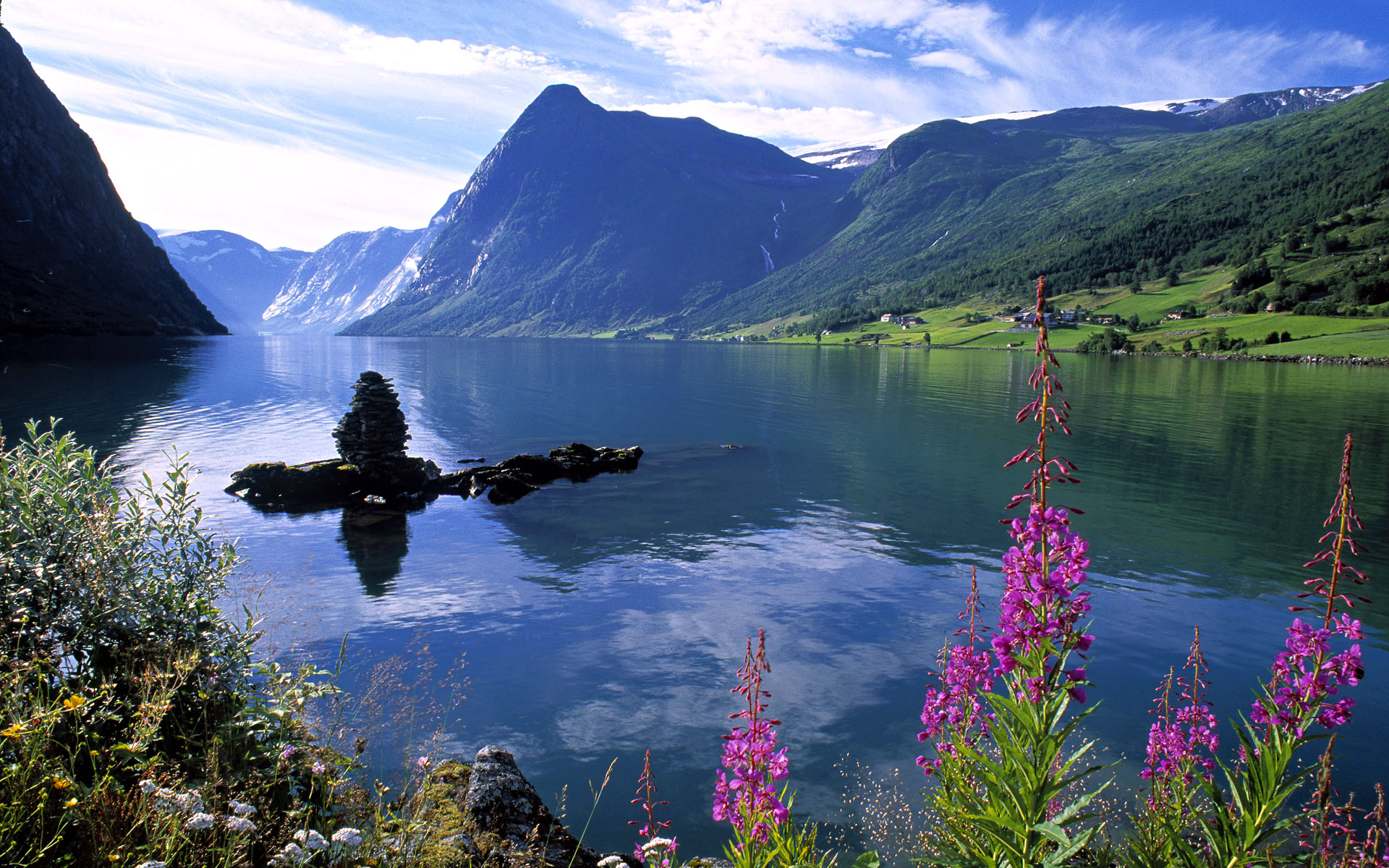

LIFE IN NORWAY.
There is something patriarchal still in Norway and Sweden. Almost primeval simplicity reigns over that northern land,—almost primeval solitude and stillness. You pass out from the gate of the town, and as if by magic, the scene changes to a wild woodland landscape. Around you are forests of fir. Overhead hang the long, fan-like branches, trailing with moss, and heavy with red and blue cones. Under foot is a carpet of leaves;
and the air is warm and balmy. On a stone bridge you cross a little silver stream, and come at once into a pleasant and sunny land of farms. Wooden fences divide the adjoining fields. Along the road are gates, which are opened by troops of children. The peasants take off their hats as you pass, and cry, "God bless you."
The houses in the villages and smaller towns are built of hewn timber and for the most part painted red. The floors of the taverns are strewn with the fragrant tips of fir boughs. In many villages there are no taverns and the peasants take turns in receiving travelers. The thrifty house-wife shows you into the best chamber, the walls of which are hung round with rude pictures of Bible scenes; and brings you her heavy silver spoons,—an heirloom, —to dip the curdled milk from the pan She sets before you oaten cakes baked some months before, or rye bread with anise-seed and coriander in it, or perhaps a little pine bark. Meanwhile the sturdy husband has brought his horses from the plow, and harnessed them to your carriage; and as soon as you are refreshed and rested, he will carry you to the next village. Along the way you meet groups of peasant-women traveling homeward or town ward in pursuit of work. They walk barefoot, carrying in their hands their wooden shoes.
Frequent along the roadside are- the village churches, each in its own little garden of Gethsemane.
In the parish register great events are doubtless recorded. Some old king was christened or buried in that church; and a little sexton, with a rusty key, shows you the baptismal font or the coffin. In the churchyard are a few flowers and much green grass, and daily the shadow of the church spire, with its tapering finger, counts the graves The tombstones are flat, and large, and low, and perhaps sunken, like the roofs of old houses. On some are armorial bearings on others only the initials of the tenants, with a date, as on the roofs of old Dutch cottages They all sleep with their heads to the, westward.
Near the churchyard gate stands a poor box, fastened to a post by iron bands, and secured by a. padlock, with a sloping wooden roof to keep off the rain. If it be Sunday, the peasants sit on the steps, and con their psalm-book, others are coming down the road with their beloved pastor, who talks to them of holy things from beneath his broad-brimmed hat. He leads them to the Good Shepherd and to the pleasant pastures of the heavenly land. He is their patriarch, and like Melchisedek, both priest and king, though he has no other throne than the church pulpit. The women carry psalm-books in their hands, wrapped in silk handkerchiefs, and listen devoutly to the good man's words. In these northern lands there is no long and lingering spring unfolding leaf and blossom one by one; no long and lingering autumn, pompous with many-colored leaves and the glow of the Indian summer.
But winter and summer pass into each other in a wonderful way. The quail has hardly ceased piping in the corn, when winter from the folds of trailing clouds sows broadcast over the land, snow, icicles, and rattling hail. The days wane apace. Erelong the sun hardly rises above the horizon, or does not rise at all. The moon and the stars shine through the day; only, at noon, they are pale and wan, and in the southern sky a red, fiery glow like sunset burns along the horizon, and then goes out. And pleasantly under the silver moon, and under the silent, solemn stars, ring the steel shoes. The days wane apace. Erelong the sun hardly rises above the horizon, or does not rise at all. The moon and the stars shine through the day; only, at noon, they are pale and wan, and in the southern sky
a red, fiery glow like sunset burns along the horizon, and then goes out. And pleasantly under the silver moon, and under the silent, solemn stars, ring the steel shoes of the skaters on the frozen sea, and voices, and the sound of bells.
And again, in a day, as it were the glad, leafy summer, full of blossoms and the song of nightingales, is come. In every village there is a May-pole fifty feet high, with wreaths and roses and ribbons streaming in the wind, and a noisy weather-cock on top, to tell the
village, whither the wind goeth and whence it cometh. The sun does not set till ten o'clock at night; and the children are at play in the streets an hour later. The windows are all open, and you may sit and read till midnight without a candle. How beautiful is the summer night, which is not night, but a sunless yet clouded day, descending upon earth with dews and shadows, and refreshing coolness! How beautiful the long mild twilight, which like a silver clasp unites today with yesterday! How Beautiful the silent hour, when Morning and Evening thus sit together, hand in hand, beneath the starless sky of midnight! From the church tower the bell tolls the hour, with a soft, musical chime;
and the watchman, whose watchtower is the belfry, blows a blast from his horn for each stroke of the hammer, and four times, to the four corners of the heavens, in a sonorous voice he chants :—
"Ho! Watchman, ho! Twelve is the clock!
God keep our town from fire and brand,
And hostile hand! Twelve is the clock!"
From his place in the belfry he can see the sun
all night long: and farther north the village priest
stands at his door in the warm midnight, and
lights his pipe with a common burning-glass; and
as he looks out into the still churchyard, he says in
his heart, "How quietly they rest, all the departed!"